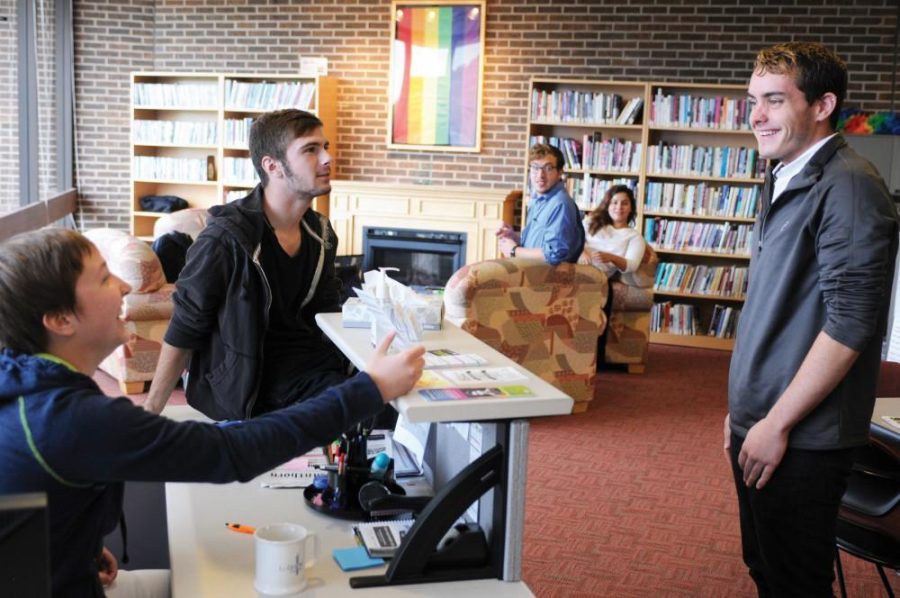A Gay-ze into LGBTQ History: An Open Door Discussion
Oct 25, 2021
Last year, Grand Valley State University was named the best university in Michigan for LGBTQ students by Campus Pride and BestColleges. The ranking combines BestColleges’ criteria of academic support and affordability data in addition to the Campus Pride Index score, a national rating system that measures LGBTQ-friendly campus life.
Campus Pride considers eight LGBTQ+ inclusive factors to reach a measurement: policy inclusion, support and institutional commitment, academic life, housing and residence life, campus safety, counseling and health, recruitment, and retention.
Part of what makes GVSU such a good campus for LGBTQ+ students is the Milton E. Ford LGBT Resource Center. This center advocates for institutional equity, promotes community-building and provides educational opportunities to create an informed, cohesive, and just campus where community members of diverse sexual orientations, gender identities, and gender presentations are supported and welcome.
The Milton E. Ford LGBT Resource Center collaborates with campus and community partners to create an inclusive and equitable environment where all are empowered to be their authentic selves. Their advocacy work advances GVSU’s commitment to a campus climate that celebrates and engages people of all gender identities, gender presentations, and sexual orientations. Using an intersectional framework, the Center promotes a more equitable campus, region, and world that values social justice and centers the needs of the most vulnerable people.
A few students from the Milton E. Ford LGBT Resource Center hosted a discussion this past Tuesday called “A Gay-ze into LGBTQ History: An Open Discussion.” The presentation was about the history of the queer community, with a focus on the 20th century and the transition into the 21st century. They also focused on the riots, uprisings and demonstrations held by queer folk that aided in the progression of gay rights in America, especially the way intersectionality plays a role in the effort. The importance is how recent a lot of these events were, and how much change has happened in such a short amount of time. Not to mention the progress that still needs to be made.
“We felt the need to present it because queer history is not only very important on a personal level to queer folk themselves, but to everyone who cares for human rights,” said student worker and program facilitator Abigail Liggett. “Since we live in a relatively accepting time, at least compared to previous years, it’s easy to forget or not fully appreciate the intense discrimination queer folk have faced, and the movements that have had to be created in order to move toward equality, equity and justice. Presentations like these are a reminder of our place within history, the strides those before us have made, and that we still have work that must be done.”
The turnout was about 10 students, and the reactions were good. They seemed to have gotten great evaluations filled out after the presentation and many students were there since we were INT 100 and 201 approved. INT stands for integrative studies here at GVSU and both of the classes have to do with looking at the world around students and diving deeper into major topics and issues. Because of this, students were most likely recommended to check out the Open Door Discussion for class.
“Our presentation was a short overview of American queer history, beginning in the early 1900s,” said student worker and speaker, Waverly Eubank. “We went over major historical events, and how these events have affected the acceptance of the queer community over time, like the move from labeling homosexuality a mental illness in the late 1800s, to the legalization of gay marriage in 2015.”
However, turnout for ODDs is often very good, and they get a lot of people that have never visited the Center to come in. Sometimes people that are introduced to the Center through ODDs become regular visitors, and that happened this time. Evaluations are most often very positive, with listeners reporting that they learned new and valuable information.
If students missed this open discussion, no need to worry. The LGBT Resource Center has at least two more planned and coming up this year. Open Door Discussions happen every month, but other student workers will host those and they’ll be on different topics.


























